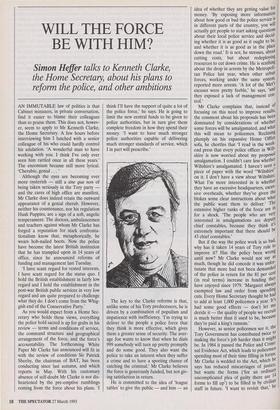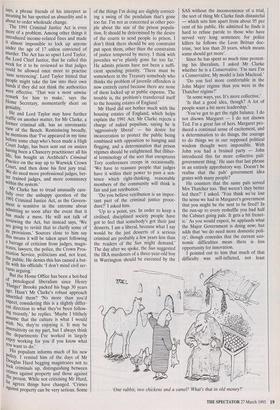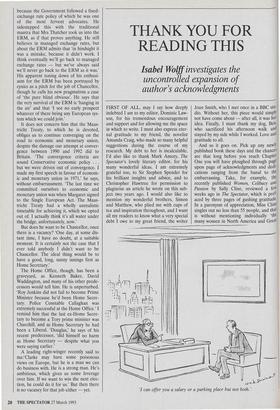WILL THE FORCE BE WITH HIM?
Simon Heifer talks to Kenneth Clarke,
the Home Secretary, about his plans to reform the police, and other ambitions
AN IMMUTABLE law of politics is that Cabinet ministers, in private conversation, find it easier to blame their colleagues than to praise them. This does not, howev- er, seem to apply to Mr Kenneth Clarke, the Home Secretary. A few hours before interviewing him I lunched with a senior colleague of his who could hardly control his adulation. 'A wonderful man to have working with you. I think I've only ever seen him rattled once in all these years.' The encomium became still more lyrical. 'Cherubic, genial . .
Although the eyes are becoming ever more oysterish — still a sine qua non of being taken seriously in the Tory party — and the cares of high office are manifest, Mr Clarke does indeed retain the outward appearance of a genial cherub. However, neither his countenance, nor his regulation Hush Puppies, are a sign of a soft, angelic temperament. The doctors, ambulancemen and teachers against whom Mr Clarke has forged a reputation for stark confronta- tionalism know that, metaphorically, he wears hob-nailed boots. Now the police have become the latest British institution that he has trampled upon in 14 years of office, since he announced reforms of funding and management last Tuesday.
'I have scant regard for vested interests. I have scant regard for the status quo. I hold the British establishment in fairly low regard and I hold the establishment in the post-war British public services in very low regard and am quite prepared to challenge what they do. I don't come from the Whig- gish end of the Conservative Party.'
As you would expect from a Home Sec- retary who holds these views, everything the police hold sacred is up for grabs in his review — terms and conditions of service, the command structure and geographical arrangement of the force, and the force's accountability. The forthcoming White Paper Mr Clarke has announced will fit in with the review of conditions Sir Patrick Sheehy, the chairman of BAT, has been conducting since last autumn, and which reports in May. With his customary absence of self-doubt Mr Clarke is not dis- heartened by the pre-emptive rumblings coming from the force about his plans. 'I think I'll have the support of quite a lot of the police force,' he says. He is going to limit the new central funds to be given to police authorities, but in turn give them complete freedom in how they spend their money. 'I want to have much stronger police authorities capable of ddlivering much stronger standards of service, which I in part will prescribe.'
The key to the Clarke reforms is that, unlike some of his Tory predecessors, he is driven by a combination of populism and impatience with inefficiency. 'I'm trying to deliver to the people a police force that they think is more effective, which gives them a greater sense of security. The aver- age Joe wants to know that when he dials 999 somebody will turn up pretty promptly and do some good. They also want the police to take an interest when they suffer a crime and to have a sporting chance of catching the criminal.' Mr Clarke believes the force is generously funded, but not giv- ing satisfaction in return.
He is committed to the idea of 'league tables' to give the public — and him — an idea of whether they are getting value for money. `By exposing more information about how good or bad the police service is in different parts of the country, you will actually get people to start asking questions about their local police service and decid- ing whether it is as good as it ought to be, and whether it is as good as in the place down the road.' It is not, he stresses, about cutting costs, but about redeploying resources to cut down crime. He is scathing about the drop in arrests by the Metropoli- tan Police last year, when other urban forces, working under the same systein, reported more arrests. 'A lot of the Met excuses were pretty feeble,' he says, 'and they exposed a lack of management con- trol.' Mr Clarke complains that, instead of focusing on this need to improve results, the comment about his proposals has been dominated by considerations of whether some forces will be amalgamated, and what this will mean to policemen. Reclining plumply on his expansive Home Office sofa, he chortles that read in the week- end press that every police officer in Wilt; shire is now worried about my proposed amalgamation. I couldn't care less whether Wiltshire's amalgamated. I haven't seen piece of paper with the word "Wiltshire on it. I don't have a view about Wiltshire. What I'm more interested in is whether they have an excessive headquarters, execs' sive overheads, whether they've given the blokes some clear instructions about what the public want them to deliver.' The extensive higher ranks of the force are in for a shock. 'The people who are verY interested in amalgamations are deput7 chief constables, because they think it 5 extremely important that there should be 43 chief constables.' But if the way the police work is so bad, why has it taken 14 years of Tory rule to improve it? Has the policy been wrong until now? Mr Clarke would not say as much, though he did concede it was unfor- tunate that more had not been demanded of the police in return for the 81 per cent (in real terms) increase in funding they have enjoyed since 1979. 'Margaret alwaYs exempted law and order from spending cuts. Every Home Secretary thought he ha,( to add at least 1,000 policemen a year. It s had some good effects — don't let In.e deride it — the quality of people we recruit is much better than it used to be, because they're paid a king's ransom.' However, as senior policemen see it, the Tory Government has contributed twice W making the force's job harder than it might be. In 1984 it passed the Police and Clional Evidence Act, which leads to policemen spending most of their time filling in forms. Mr Clarke is wedded to the Act, which. he says has reduced miscarriages of justice, but wants the forms ('for an ordinary uncomplicated plea of guilty there are .14 forms to fill up') to be filled in by civilian staff in future. 'I want to revisit that, he says, a phrase friends of his interpret as meaning he has spotted an absurdity and is about to order wholesale change. The 1991 Criminal Justice Act is even more of a problem. Among other things it introduced income-related fines and made It almost impossible to lock up anyone under the age of 17 unless convicted of murder. The Act has so upset Lord Taylor, the Lord Chief Justice, that he called this week for it to be reviewed so that judges Fonld be allowed once more to practise sane sentencing'. Lord Taylor hinted that People might take the law into their own hands if they did not think the authorities Were effective. 'That was a most unwise remark for him to make,' says the Home Secretary, momentarily short on geniality. He and Lord Taylor may have further traffic on another matter, for Mr Clarke, a former criminal silk, has an unromantic view of the Bench. Reminiscing broadly, he mentions that 'I've appeared in my time before some chap who's been made a High Court Judge, has been sent out on assizes !taving been a Chancery practitioner all his 'de, has bought an Archbold's Criminal Practice on the way up to Warwick Crown Court, and then done his first jury trial. We do need more professional judges, bet- ter trained judges, and more consistency Within the system.' Mr Clarke has to tread unusually care- IIY over the unhappy question of the 1991 Criminal Justice Act, as the Govern- ment is sensitive in the extreme about admitting so soon after the event that it has made a mess. He will not talk of reviewing the Act, but instead says, 'We are going to revisit that to clarify some of its provisions.' Sources close to him say tills means it will be taken apart following a barrage of criticism from judges, magis- trates, lawyers, the police, the Crown Pros- ecution Service, politicians and, not least, the public. He denies this has caused a bat- tle with his officials: 'I don't mind civil ser- vants arguing.' But the Home Office has been a hot-bed ?f penological liberalism since Henry Hanger' Brooke packed his bags 30 years age. Hasn't Mr Clarke's robust approach unsettled them? 'No more than you'd eicPect, considering this is a slightly differ- ent to what they've been follow- ing recently,' he replies. 'Maybe I blithely assume that the culture is what I would isb. No, they're enjoying it. It may be ntsensitivity on my part, but I always think the departments I've worked in largely enloy working for you if you know what Yen want to do.' His populism informs much of his new ITlieY. I remind him of the days of Mr , englas Hurd begging magistrates not to ieCk criminals up, distinguishing between crimes against property and those against ti_he person. While not criticising Mr Hurd, agrees things have changed. 'Crimes against property can be very serious. Some of the things I'm doing are slightly correct- ing a swing of the pendulum that's gone too far. I'm not as concerned as other peo- ple about the size of the prison popula- tion. It should be determined by the desire of the courts to send people to prison. I don't think there should be any constraint put upon them, other than the constraints of justice tempered by mercy. I think with juveniles we've plainly gone far too far.' He admits prisons have not been a suffi- cient spending priority. 'There must be somewhere in the Treasury somebody who thinks the problem of juvenile offenders is now entirely cured because there are none of them locked up at public expense. The trouble is, the problem's transferred itself to the housing estates of England.' Mr Hurd did not bother much with the housing estates of England, which helps explain the 1991 Act. Mr Clarke rejects a charge of naked populism, saying he is 'aggressively liberal' — his desire for incarceration to protect the public being combined with opposition to hanging and flogging, and a determination that prison regimes should be enlightened. But illiber- al terminology of the sort that enraptures Tory conferences creeps in occasionally. 'We have to reassure people that judges have it within their power to pass a sen- tence which right-thinking, reasonable members of the community will think is fair and just retribution.' `Do you believe retribution is an impor- tant part of the criminal justice proce- dure?' I asked him.
'Up to a point, yes. In order to keep a civilised, disciplined society people have got to feel that somebody's got their just desserts. I am a liberal, because what I say would be the just desserts of a serious criminal are probably a few years less than the readers of the Sun might demand.' The day after we spoke, the Sun suggested the IRA murderers of a three-year-old boy in Warrington should be executed by the SAS without the inconvenience of a trial, the sort of thing Mr Clarke finds distasteful — which sets him apart from about 95 per cent of his public. He admitted he finds it hard to refuse parole to those who have served very long sentences; for police killers he follows the Leon Brittan doc- trine, 'not less than 20 years, which means some should get more'.
Since he has spent so much time protest- ing his liberalism, I asked Mr Clarke whether he is a Conservative. 'I'm sure I'm a Conservative. My model is lain Macleod.'
'Do you feel more comfortable in the John Major regime than you were in the Thatcher regime?' 'In some ways, yes. It's more collective.' 'Is that a good idea, though? A lot of people want a bit more leadership.' 'You've got to get the right balance. I do not disown Margaret — I do not disown Ted. I'm a great fan of hers. Margaret pro- duced a continual sense of excitement, and a determination to do things, the courage to do things we in our supposed political wisdom thought were impossible. With John you had a bruised party — John introduced this far more collective pals' government thing.' He uses that last phrase in an entirely approbatory way. Doesn't he realise that the pals' government idea grates with many people? He counters that the same pals served Mrs Thatcher too. 'But weren't they better led then?' I asked. 'You think we've lost the sense we had in Margaret's government that you might be the next to be fired? In the run-up to every reshuffle you had half the Cabinet going pale. It gets a bit frenet- ic.' As you would expect, he applauds what the Major Government is doing now; but adds that 'we do need more domestic poli- cy', though concedes that the current eco- nomic difficulties mean there is less opportunity for innovation. I pointed out to him that much of that difficulty was self-inflicted, not least 'One rabbit, two chickens and a camel? What's that in old money?' because the Government followed a fixed- exchange rate policy of which he was one of the most fervent advocates. He sidestepped this with the traditional mantra that Mrs Thatcher took us into the ERM, as if that proves anything. He still believes in managed exchange rates, but about the ERM admits that 'in hindsight it was a mistake, because it didn't work. I think eventually we'll go back to managed exchange rates — but we've always said we'll never go back to the ERM as it was.' His apparent toning down of his enthusi- asm for the ERM has been portrayed by cynics as a pitch for the job of Chancellor, though he calls his new pragmatism a case of 'the pure blind obvious'. He says that the very survival of the ERM is 'hanging in the air' and that 'I see no early prospect whatever of there being any European sys- tem which we could join.'
It does not concern him that the Maas- tricht Treaty, to which he is devoted, obliges us to continue converging on the road to economic and monetary union, despite the damage our attempt at conver- gence between 1990 and 1992 did to Britain. 'The convergence criteria are sound Conservative economic policy . . but we were driven out of convergence. I made my first speech in favour of econom- ic and monetary union in 1971,' he says, without embarrassment. 'The last time we committed ourselves to economic and monetary union was when Margaret signed to the Single European Act. The Maas- tricht Treaty had a wholly unrealistic timetable for achieving it, which we opted out of. I actually think it's all water under the bridge, unfortunately, now.'
But does he want to be Chancellor, once there is a vacancy? 'One day, at some dis- tant time, I have no doubt, at a suitable moment. It is certainly not the case that I ever told anybody I didn't want to be Chancellor. The ideal thing would be to have a good, long, sunny innings first as Home Secretary.'
The Home Office, though, has been a graveyard, as Kenneth Baker, David Waddington, and many of his other prede- cessors would tell him. He is unperturbed. 'Roy Jenkins did not fail to become Prime Minister because he'd been Home Secre- tary. Police Constable Callaghan was extremely successful at the Home Office.' I remind him that the last ex-Home Secre- tary to become a Tory prime minister was Churchill, and as Home Secretary he had been a Liberal. 'Douglas,' he says of his recent predecessor, 'did himself no harm as Home Secretary — despite what you were saying earlier.'
A leading right-winger recently said to me:`Clarke may have some poisonous views on Europe, but he is a man we can do business with. He is a strong man. He's ambitious, which gives us some leverage over him. If we want to win the next elec- tion, he could do it for us.' But then there is no vacancy for that job either — yet.




























































 Previous page
Previous page